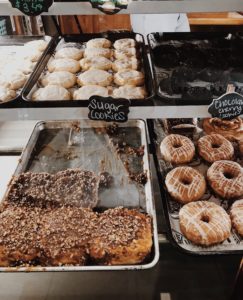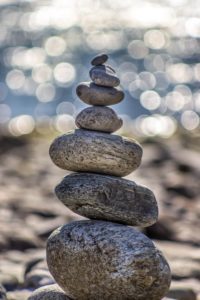by Jenny Rose | Sep 11, 2022 | Choice, Power
Probably every child is told we all have to do things we don’t want to do.

Photo by Cristina Gottardi on Unsplash
Children are concrete, and I was no exception. When I heard we all have to do things we don’t want to do, I thought it meant that’s what life was supposed to be about, a kind of slavery to all those things we don’t want to do. No one talked to me about balance, or doing the things we do want to do.
It made life seem like an unhappy business, years and years of unending duty, responsibility, and doing what I didn’t want to do. No recess. Or maybe what I really wanted to do was bad and wrong? Maybe I should want to do what I didn’t want to do. I wasn’t sure. A part of me went underground. I didn’t want anyone to know how bad I was, how flawed. I worked hard at the things I didn’t want to do and hid the things I did want to do, in case they were wrong.
But I couldn’t conceal the feeling of wanting and not wanting from myself. I used to make hidey holes in whatever house we were living in at the time and go to ground with a book, but I always felt guilty. I wanted to read. Doing what I wanted to do was bad. I should have been helping my mom do all the things she didn’t want to do.
The pronouncement that we all have to do things we don’t want to do is stated as a Cosmic Truth, especially as an adult tells it to a child. It’s loaded with feelings and experience a child can’t possibly understand, but the subtext was clear to me:
Life is not much fun.
I can’t resist picking apart Cosmic Truths as an adult, and as I think about this one it occurs to me it really has to do with personal power more than wanting or not wanting. It’s not framed in terms of personal power because our emotional intelligence is so low. Making choices based on whether we want to do something or not is childish. Power resides in the act of choice, not in the wanting or not wanting.
Steering our lives solely by our desires is hedonism, a belief that satisfaction of desires is the purpose of life. Desire, though, is so shallow, so fleeting. And it’s never permanently satisfied. No matter how well and pleasurably we’ve eaten, we’ll be hungry again. Desire is a treadmill we can never get off.

This is not to say we shouldn’t ever choose something we want or say no to something we don’t want, but our desire is easily manipulated. That’s why advertising works. If we can be easily manipulated, we’re not standing in our power. Addiction is based, at least in the beginning, on wanting and not wanting.
A more useful question than What do I want to do? is What would be the most powerful thing to do? We might want to eat a carton of ice cream, but a walk feeds our health, well-being, and thus personal power much better. After all, one carton of ice cream leads nowhere but to another. Personal power can lead us to joy and experience a carton of ice cream never dreamed of.
- If we don’t choose to do difficult, frightening, or new things, we’ll never grow.
- If we don’t choose to take care of our bodies, they won’t function well.
- If we don’t choose to be self-sufficient and resilient, we’ll be dependent.
- If we don’t choose to learn anything, we’ll remain ignorant.
- If we don’t choose to plan ahead, prepare, or manage consequences, we diminish our choices, waste resource, and weaken the contribution we’re capable of making.
- If we don’t choose the responsibility of commitment and making choices, someone else will make our choices for us.
And so on.
I’m changing the frame. I’m less interested in what I want and what I don’t want and more interested in how my choices affect my power, and the power of those around me. I’m willing to do what I don’t want to do if it’s a step on a road leading to integrity, power, healthy relationship, or anything else important to me. At the same time, I can exercise my right to say no to things that won’t take me where I want to go.
It’s about power, not desire. Any three-year-old can want and not want. It takes an adult to manage a healthy balance of personal power.

Photo by Deniz Altindas on Unsplash
by Jenny Rose | Aug 20, 2022 | Connection & Community, Emotional Intelligence
Trust: Firm belief in the reliability, truth, ability or strength of someone or something (Oxford Online Dictionary)
Mistrust: General sense of unease towards someone or something
Distrust: Specific lack of trust based on experience or reliable information
Leo Babauta recently published a piece on practicing trust which has given me much food for thought.
Trust is an uncomfortable subject for me. For most of my life I’ve considered myself to be shamefully distrustful. As I’ve learned emotional intelligence, I’ve realized I have plenty of good reasons for my mistrust and distrust, but there’s still a part of me that feels I should be more trusting, more willing to give others a second, or third, or hundredth chance, less guarded, more open, more forgiving.

Photo by Liane Metzler on Unsplash
Except I know intellectually forgiveness does not mean an automatic reinstatement of trust.
In my heart, I feel like a bad person, especially a bad woman, because throughout my life people who say they love me have appeared to be hurt by my lack of trust. Yet those same people have given me reasons not to trust them.
When I wind up in these confusing emotional cul-de-sacs, I blame myself. I’m being too dramatic (again). I’m being a bitch. I’m mean. I can’t love, or let anyone love me. (Does trust = love? Does all love automatically come with trust?) When I explain the specific events leading to my mis- or distrust, I’ve frequently been told the other party doesn’t remember saying what they said or doing what they did. This implies I’m nitpicking, ridiculously sensitive, keeping score, or even making it up. I wonder if I’m being gaslighted, or if I’m just not a nice person.
Years and years ago I made a rule for myself: give every situation or person three chances before deciding not to trust. It still feels fair to me. Sometimes things happen. We have a bad day. We say hurtful things, or don’t keep our word, or make a boneheaded choice, breaking trust with someone. I know I’ve done it, and I’d like to be given the benefit of a doubt.
The benefit of a doubt is fair, right?
I still follow that rule. It feels appropriately kind to others and like good self-care. Yet I feel guilt nearly every day over the people in my life who I want to trust, feel that I should trust, and don’t trust.
Babauta’s article specifically addresses signs of distrust of ourselves, and some ideas about practicing self-trust. I never connected problems with focus, fear or uncertainty, procrastination or indecision with lack of self-trust, but I can see they might be. If we don’t trust our priorities, resilience, or choices, it’s difficult to be decisive or take risks with commitments and problem solving.
If we don’t trust ourselves to cope effectively with sudden changes and reversals and frightening situations, uncertainty and chaos disable us, making us vulnerable to anyone or anything promising relief, certainty, or help.
The boundary between trust in ourselves and trust in others is permeable. If we define ourselves, as I do, as “having trust issues,” presumably that includes issues with ourselves as well as others.
It makes me shudder to imagine living with no feeling of belief in the reliability, truth, ability or strength of anyone or anything. How could anyone sustain such an emotionally isolated condition, not only from those around them but from themselves?
I do have people in my life I trust. Is it possible I don’t have trust issues? Is that just a polite, apologetic, and roundabout way of avoiding a direct “I don’t trust you?”
Do I have to answer that?
It’s true I trust far fewer people than I distrust.
But it’s also true I give people and situations a chance. Three chances, in fact. At least.
Why does it seem so cruel to tell someone we don’t trust them?
Trust, as I experience it, is not all or nothing. I might trust a person to be kind and caring but never allow them to drive me anywhere. I might trust a person with money but never trust them to be on time. I trust myself to be there for others, but I haven’t trusted myself to be there for me.
Consumerism is about distrust. We’re actively groomed to distrust ourselves. Yesterday I was laughing with a friend about articles on MSN. There was an article about trends and fashion in decorating, as though it matters. Shiplap is out. White kitchens are out. Accent walls are out. Then there was an article about how to properly fold plastic grocery bags. I’m not kidding. Did you know you’ve been storing plastic grocery bags the WRONG WAY all these years? How could you be so incompetent? A capitalist culture only survives as long as people buy things, and advertising (and a lot of other media) is about the ways you need to improve, do it right, be better.
Advertising is manufactured distrust. We’re inadequate, but a widget would make us better. We buy, and we discover we still don’t feel good enough, and another ad tells us we need a nidget. So we buy that, but then we see a gidget on sale that will make us even better …
Who benefits most from our lack of trust in ourselves?
I believe information is power. I believe education is power. I believe in science, data, and critical thinking. I trust those things.
Who benefits most from the breakdown of public education, the demonization and gutting of scientific organizations and communities, manufactured misinformation, manufactured disinformation, and “alternative facts?”

Photo by roya ann miller on Unsplash
The Center For Nonviolent Communication says trust is a human need; it’s listed under connection needs. When our needs aren’t met, our health (mental, physical, emotional) suffers. If we are unable to trust we’re wide open to conspiracy theorists, ideologues, authoritarians, and other abusers and manipulators. Predators happily gorge off the results of manufactured distrust.
This is a big, big, problem, because it stands between us and managing things like climate change. Which, depending on who you talk to, isn’t even real because science has been the target of so much manufactured distrust.
One day, sooner rather than later in the Southwest, a switch won’t deliver electricity and a faucet won’t deliver water. Scientists have been talking about consequences of climate change and drought in the area for decades. It was one of the reasons I left my lifelong home in Colorado and came to Maine nearly eight years ago. A combination of manufactured distrust, denial, and the misplaced priority of winning the next election have effectively stopped any kind of collaborative or cooperative problem-solving around water usage throughout the Colorado River watershed, and here we are, on the brink of multi-state disaster that will affect the whole country.
Trust is a choice we make many times a day. Do we trust our families, coworkers, and friends? Do we trust the headlines we read, the news anchor we hear, or the algorithms providing us with “information” on social media? Do we trust what lands in our Inbox or the unfamiliar number calling us? Do we trust the oncoming car will really stop so we can safely walk across the busy street?
More importantly, do we trust our own instincts, feelings, and capability? Do we actively teach our children to trust theirs? Do we encourage our friends and loved ones to trust themselves? Or do we tell people they have it wrong, it didn’t happen, they’re being ridiculous, they don’t understand?
Choice comes with consequences and responsibility. Choice is dynamic; do we trust if we make a choice that doesn’t work out the way we hoped, we’ll choose again? Do we trust ourselves to be wrong and learn something before we choose again? Do we trust our ability to problem solve, bounce back, and do the best we can most of the time?
I suppose somewhere between having no trust at all and trusting everyone and everything lies a fine line of willingness to trust. We could approach new situations and people with curiosity and an open mind, be big enough to give the benefit of the doubt, and have healthy enough boundaries and the self-trust to disengage when we have evidence and experience indicating our trust is misplaced.
The first step in rejecting manufactured distrust is building trust in ourselves and demonstrating our own reliability, truth, ability and strength as we engage with others.

Photo by Ryan Moreno on Unsplash
by Jenny Rose | Apr 23, 2022 | Emotional Intelligence, Feelings
All my life I’ve been told I overreact and I’m too dramatic, two labels which automatically invalidate my experience, feelings, and any attempt I make to communicate honestly.
Being told we’re overreacting is a sure way to shut us down, especially when we hear it regularly. It makes us question our own experience. It breaks connection and trust. It isolates us in shame.
It’s an insidious form of gaslighting.

Photo by Jonathan Crews on Unsplash
When I went through emotional intelligence coaching, I understood being told I’m dramatic is code for, “Your feelings make me uncomfortable.” It’s not a message about me at all, it’s a message about the person with whom I’m interacting.
As a child, I believed I exaggerated and I was too dramatic. I pushed my feelings down and hid them. I didn’t respond to my own distress. I didn’t ask for help. I trusted no one with my real emotions. I taught myself to become stoic and uncomplaining, to focus on the positive, to carry on no matter what.
My feelings became my enemies. I was deeply ashamed of them. They were bad and wrong and they hurt other people.
Now, decades later, I think a lot about feelings as I struggle with my re-triggered autoimmune disease. I know my current physical pain mirrors my emotional pain, which consists of passionate, intense feelings. Learning to manage those feelings more effectively is a work in progress. I do well with one at a time, but right now I’m overwhelmed with emotion. Emotional overwhelm is the trigger for physical pain. I keep right on keeping on through difficult feelings, but once the anguish is translated into back spasm, I can no longer hide or ignore my pain. Everyone else can see. Everyone else knows. I can’t hide my physical disability.
My body betrays me.
Horrors. I cringe, waiting to be told I’m too dramatic and I overreact. My feelings are wrong. They make others uncomfortable. They’re shameful, immature, crazy. I have nothing to complain about. Others have much harder lives than I do. It’s my business to support, not ask for support.
But my body tells the truth. Physically, everything hurts.
The truth beneath that truth is my heart hurts. I’m scared, I’m angry, I feel alone, I feel supported and horribly vulnerable, I’m excited about new beginnings, I feel guilty and ashamed about struggling, I feel relieved, and I don’t know how to bear my grief, both current and past. But I’m still too distant from my feeling experience to encompass all that, let alone manage it effectively.

Photo by Cristian Newman on Unsplash
So, back pain.
In the middle of this experience, I read an article by Courtney Carver from Be More With Less titled “5 Thoughtful Ways to Help You Underreact.” As you can imagine, it caught my eye.
Every day I think about this list of five strategies, and the difference between overreaction and feelings.
Overreaction is defined as a more emotional response than is warranted. Who decides what kind of an emotional response is warranted? Some people feel things very strongly and vividly; others do not. Certain events and situations trigger deep emotions for all of us. Do any of us have a right to judge another person as overreacting, especially when we can’t possibly know the entirety of their private emotional experience? Certainly, some people appear to overreact frequently, but do we stop to ask ourselves, or them, for more information? What is going on? What is behind the perceived overreaction? What need is crying out to be met? What are the feelings involved in the overreaction?
Feelings are value-neutral raw data we’re all biologically wired to experience. They’re simple. Mad. Sad. Glad. Scared. Ashamed.
We’re largely not in control of the complicated neurological and chemical experience of our feelings. We are able to control how we think about, express, and act out our feelings.
Thoughts and feelings are not the same thing.
I’m familiar with some of the strategies Carver writes about in her piece, but I’ve never seen such a concise and useful list of ways to manage habits of thought leading to “overreaction.”
It’s not our business to be concerned with onlookers who attempt to shut us down because of their own discomfort with feelings. Our business is learning how to refrain from shutting ourselves down or allowing anyone else to do so. Our business is taking care we don’t hurt ourselves as we feel our feelings.
Here’s Carver’s list:
- Do what you can. Let the rest go.
- Determine if any action or reaction is useful or effective in the first place. Does this deserve my time and energy?
- Don’t take anything personally.
- Distinguish between inside and outside. We can’t control what happens outside us. Our power lies within us.
- Closely related to the last strategy, if we feel we’re overreacting, what else is going on? Are we sick, hurt, dealing with unfinished feelings or unhealed wounds, struggling with addiction, lonely, tired, hungry? We need to focus on supporting ourselves.
Some people don’t want to deal with feelings, their own or anyone else’s. I understand. Such people will always struggle with someone like me, who feels deeply and expresses vividly. To them, I will always look as though I’m overreacting.
What overreacting means to me, though, is the intensity of my feelings is negatively affecting my health, and I need to find ways to support myself. I don’t want to feel less. I want to feel better.

Photo by Ben White on Unsplash
by Jenny Rose | Apr 16, 2022 | A Flourishing Woman, The Journey
In the online Red Cross Lifeguard Course, there’s a segment titled “When Things Don’t Go As Planned.” Every time I come across it, I smile.

Photo by NeONBRAND on Unsplash
Yes, indeedy. Because things often don’t go as planned.
Learning, in a real or virtual classroom, from text or videos or slideshows or YouTube, is necessarily simplified. The situations are controlled. Even the blood looks like cherry-flavored candy.
As a blogger, I ruminate, explore, define, proceed logically, and research. I’ve touched on so many different topics over the years here on Harvesting Stones. I’ve examined needs and boundaries, reciprocity and connection, contribution and authenticity.
However, this kind of intellectual exercise, learning at a remove, is not where the real mastery is.
The mastery comes when we put it all into action in real life. And real life is unbelievably messy. Real life is a loose cannon on a rolling deck. Real life does not go as planned.
We are occasionally plunged into chaos, into complicated experiences involving a lot of feelings and requiring all our skills. Our predictable routines and schedules turn inside out. We are not able to care for ourselves or anybody else as usual. We become exhausted. Our personal demons crawl out of our subconscious attics and cellars and play with us. Our physical weaknesses take advantage of our stress. We lose track of our power. We lose track of ourselves.

Photo by Quino Al on Unsplash
I would avoid such times if I could. I believe most of us would. Few people enjoy living in a maelstrom. The thing is, the maelstrom holds gifts, insights and growth we would never realize if we always lived serene, well-controlled lives.
I’m writing this on Wednesday morning. A week ago today, less than 24 hours before closing on the house we’re selling and the house we’re buying, closing was cancelled. Well, “extended.” I’m not sure there’s a difference, but my hope is pretty frayed right now, so I’m inclined to be pessimistic.
I thought I had been living in chaos before that abrupt last-minute change of plans, but those far-off days seem like a cake walk compared to what the last seven days have been like for me.
When our lives fall apart in painful ways, part of the stress of it is the rest of the world goes right on without giving us space and time to process, remember our resilience, and get back on our feet. I still needed to figure out how to get the car in to get the studded snows changed. I still have bills to pay. I still have a job. I still need to search the stores for cat food. I still have family birthdays to remember. The bed still needs to be made, the dishes washed, the laundry done. I want to remain consistent in my writing.
Autoimmune disease is highly opportunistic. I have not had this amount of stress since I moved to Maine seven years ago, and within a few hours of the cancelled closings my back went into spasm, which means I need all the love, rest, and care I can give myself right now, in the middle of the shit show. My body would feel better if we could close and get this move over with. And I can’t possibly move with this level of pain.
Meanwhile, the world turns. I feel guilty about my struggle when I know people in Ukraine are losing their homes, lives, loved ones, and perhaps their country. I tell myself I’m being dramatic, I’m whining, I never deserved for things to work out in the first place, etc., etc.
I told you about the personal demons crawling out, right?
So what do we do during times like these? How do we get through them? How do I turn the concepts of letting go, courage, detachment from outcomes, and emotional intelligence into tools to help myself? It’s all so clear, logical, and neat on the page/screen. I believe every word I write. It’s all organized and categorized.
When things don’t go as planned, nothing is neat, organized, or categorized. We can’t think well. Our feelings sweep us from fear to fury to despair and back again.
In my old dance group, we used to say when you feel overwhelmed, dance small.
Dance. Small.
Dancing small is focusing on breathing in and out. It’s making small movements. It’s wrapping your arms around yourself, facing a wall or a corner, closing your eyes, and concentrating on the floor under your feet. It’s deliberately sinking into yourself and letting everything and everyone else go as best you can. It might be the healing release of tears.

Photo by Leon Liu on Unsplash
This strategy doesn’t make the chaos go away, but it does give us a small resting place within the chaos. It allows us to find and hold onto ourselves. It gives us a tiny bit of power. It allows a little space for rational thought, for us to remind ourselves of what’s true:
- Nothing stays the same; all things pass
- Things invariably work out somehow, some way
- There is always much to be grateful for
- We are allowed to have feelings about our experience, and they’re allowed to be messy
- We always have some choice
- None of it is personal
This week, though in many ways painful and difficult, has also provided me with valuable practical experience in using some of my newer skills. It’s given me a chance to stay in my own power, always a worthy practice. I’ve had an epiphany about a longstanding destructive pattern in my relationships which has emotionally freed me in significant ways. Paradoxically, the current chaos has brought me clarity.
I’ve also been touched and humbled by the support I’ve received from friends and other members of my community. I am not alone.
Most of all, it’s given me a chance to deal with my feelings. It occurs to me the word “stress” is misleading. I don’t need to deal with my stress. My feelings need attention. They need to be named, welcomed, fully experienced, and released, no matter if they’re in my head, heart, or back. Managing my feelings will take care of my stress and my physical discomfort.
By the time you read this, things will have changed. Perhaps we’ll have a new closing date. Perhaps I’ll have decided to make a different plan. Perhaps we’ll still be in limbo, but it will be a different day in limbo. Today, we’ve taken my car in to get the tires changed, so that’s something taken care of. At some point, the muscles in my back will unclench and I’ll move freely again and be able to resume exercise.
Meanwhile, frogs boom, chuckle, and peep in the pond. The birds are busy and the spring dawn chorus gladdens each morning. The phoebe has returned and hunts from the barn roof. Rain falls and the sun shines. The mud is gradually drying up. I will feed the cats, play with them, clean their boxes. I’ll go to work, teach swim lessons, wipe down the locker rooms, read the pool chemicals, guard lives, answer the phone. I’ll feed myself, drink cups of tea, rest, write, read, and sleep. Time will pass. Days will pass.
It will all pass, the things that go as planned, and the things that don’t.

Photo by henry fournier on Unsplash
by Jenny Rose | Apr 2, 2022 | A Flourishing Woman, The Journey
Unless the sky falls (again), we will be moving in less than a week. It’s hard to believe. In fact, it’s impossible to believe, but that’s okay. Today is real, and I know what I need to do right now. The future can take care of itself.
As I moved around the kitchen early this morning, feeding (and tripping over) the cats, making breakfast, heating water for tea, watching the sky lighten, it occurred to me the last seven years in this old farmhouse have taught me a magnificent lesson.

Maine Farmhouse and Barn
When I moved to Maine, I had a solid idea about what I was moving into, a whole set of expectations and dreams, none of which turned out to be real.
The loss of my fantasies was heartbreaking and took me years to process. During that time, I started this blog and later remodeled it, finished my first book, wrote my second, and began my third, started publishing my fiction serially on Substack, put everything I’ve learned about emotional intelligence into action, grew deep roots in my community, found a great job I love, and became part of a second family.
At the same time, I experienced disempowerment in terms of my living space and physical surroundings. Never before have I lived in a place where I had so little power to respond to my needs and preferences, and never have I been so overwhelmed with maintenance tasks I could not take care of.
Because of my emotional intelligence training, my disempowerment was visible to me, and I was able to turn towards what I did have power over, again and again, until it became second nature. It didn’t feel good, but it was invaluable practice in managing my own power, at recognizing my own power.
Always before in my life, I’ve had plans and projects, things I wanted to buy, walls I wanted to paint, the ability to rearrange furniture, make repairs, have new shelves built, and discard what was no longer useful. Such activity gave me a great deal of pleasure and was thoroughly distracting. It was never finished, so I stayed firmly focused on externals.
In this house, that distraction has been unavailable. To stand in my own power has been to stand still with myself, to work internally, to feel my feelings, create, stretch, grow, learn, explore. It’s been lonely. It’s been uncomfortable. It’s been transformative. It’s been internal, invisible, and has nothing to do with a shiny presentation.

Photo by Alex Iby on Unsplash
Most of us would acknowledge real change and healing come from the inside, not from the surface. But understanding that intellectually is not the same as spending years living it. I would never have voluntarily given up the power to manage my surroundings. When I realized it was happening I had a choice to make, and I chose to explore this new, unexpected territory.
That choice is one of the best I’ve ever made.
I have learned a dream home, a dream wardrobe, a dream body, a dream library, is not a life. What others see of me and my possessions and home is not me. My presentation has nothing to do with my state of health, presence, and groundedness.
Our new home is old, though not as old as this farm, and it needs some work. Sure, it needs new exterior paint and other cosmetic help, but that’s not where I’ll start. Those changes are fun and everyone can see and appreciate them, but the invisible, internal issues like plumbing, wiring, and insulation are what will really make a difference to my experience living there.
The looks of the new house are not what matters. It’s the life we create inside it that matters.
The color of my hair doesn’t matter. It’s what’s inside my head that matters.
The clothes I wear don’t matter. It’s the health and peace in my body that matter.
Attaining perfection (and perfect control) of my space is not what matters. It’s the ability to manage my thoughts and feelings, maintain integrity, and live well that matter.
In these last few days of packing, sorting, and endless tasks and details, at every step I’m thinking about what I learned and how grateful I am for the lesson. I didn’t choose to learn it. I wouldn’t have volunteered to learn it. I was forced into it, tricked into it, even.
But that’s not important. My life has consistently taken me exactly where I need to go, in spite of how much I whine and complain about some of the places I’ve been. Now, just ahead, is a whole new chapter.
I wonder what I will learn.
(Next weekend we’re moving, so you won’t see a post here from me. I’ll be back in two weeks!)

Photo by Michal Balog on Unsplash















